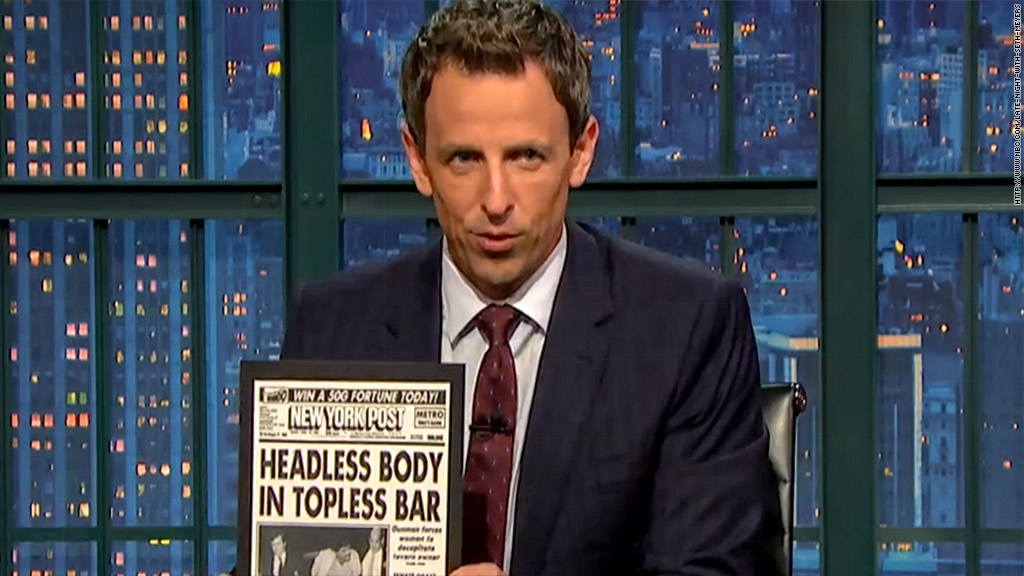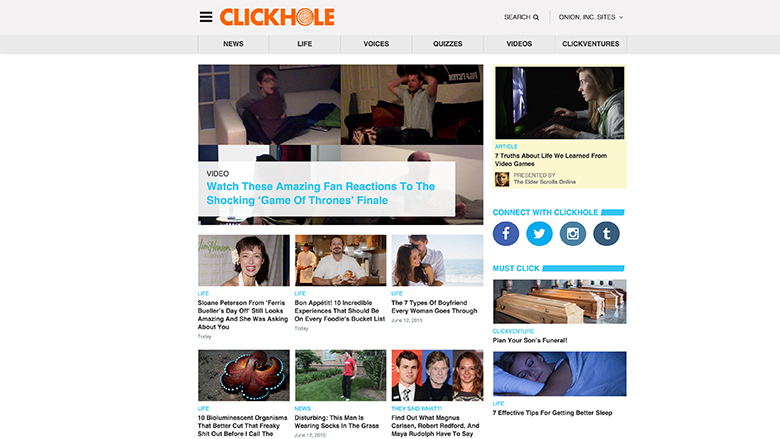
If you want to see people actually agree with each other on the Internet, just watch the celebration among journalists on Twitter when a new Clickhole post drops.
Clickhole, a product of the satirical media company The Onion, marked its first birthday last week.
The site exists to skewer the viral memes and made-you-click articles that typify digital journalism, yet it's become revered by the very same writers who give it something to mock.
Clickhole is that good.
And it's going to "continue to evolve with the media it's parodying," Clickhole editor Jermaine Affonso says. "It will continue mocking it and moving with it."
The site's genesis is in slideshows made by The Onion. The satirical newspaper has masterfully employed the dispassionate prose of journalism to file "reports" on both fantastical events ("President To Face Down Monster Attack, Own Demons In Action-Packed Schedule") and banal everyday affairs ("Only 20 Minutes Until Introverted Man Gets To Leave Party").
In 2013, The Onion broke from its tried-and-true parodies of straight news to mimic the wildly popular slideshows that none of us can escape.
Some were meta, like the one that offered 10 slides that "still need a slideshow home."
Others flipped the script on the sentimental tenor that reverberates throughout the Internet these days.
A slideshow in June of 2013, for example, invited readers to glance over several "adorable photos of baby farm animals" -- but there was one twisted caveat. With each click, readers were warned, an appendage would be removed from the body of a faceless employee at The Onion. "How Far Will You Go?" the headline asked. "When Will You Let It Stop?"
"We were able to have fun with those slideshows, but we also felt like if we just spun it off as its own site that would be the best way to capture the sheer magnitude and grossness of clickbait culture," Affonso told CNNMoney.
Affonso, a former Onion writer, said Clickhole clearly has the mothership's DNA. They both work out of the same Chicago office, and Clickhole's staff is filled with Onion veterans.
Originally billed as The Onion's answer to BuzzFeed, Clickhole has become a send-up of online culture. Lately, the site has had a field day with the oral histories that have become ubiquitous on sites like Grantland.

Clickhole's satire comes across most potently in the posts that bear a striking resemblance to content published by non-satirical outlets.
Take a list that appeared on the site last week: "The 7 Types Of Boyfriend Every Woman Goes Through." That headline could exist anywhere on the Internet. The absurdity only becomes apparent after the click, when it is revealed that the seven types of boyfriend are really just members of the E Street Band.
The site's inaugural year of critiquing Internet clickbait has, not surprisingly, gained a lot of clicks. According to Quantcast, Clickhole notched nearly four million unique visitors last month, compared with a little more than seven million for its better known parent site.
Perhaps the site's most indelible moment came with the post titled "'90s Kids Rejoice! The Spider Eggs They Used To Fill Beanie Babies Are Finally Hatching!" It captured the nostalgic spirit that colors so much online content. It also sent many parents into a frenzy. Affonso said the post prompted a panic-stricken older woman to call Clickhole's office.
"She said she had taped her Beanie Babies up and wanted to know what else she could do," Affonso said. "It was very sad."
So where do the ideas come from?
Affonso said his staff meets three times a week to go over pitches. There are only about eight people who attend those meetings, but many of the items on the site originate with a robust network of people who contribute ideas.
The contributors email their ideas to Clickhole and, if they're good enough, the site's staff fleshes them out. One contributor told CNNMoney that the secret email address used to submit pitches is sometimes like a "big blackhole."
He said he often submits a handful of ideas at once, but he rarely knows how many are accepted until he checks his bank account. Clickhole, he said, always makes good.
The contributor asked to speak on condition of anonymity because, as he said, "the culture of secrecy around Clickhole is a sacred thing." None of the site's post's have bylines, a practice that Affonso says is appropriate for multiple reasons.
"It's ultimately a collaborative process. You'll have one person write a headline, another person will write an article, and another person will do a graphic for it. And the entire room talks through jokes together," he said. "But it's also more fun this way. All this material is coming from everywhere. It's a parody of an aggregation site, and the Internet doesn't care where the content comes from."


